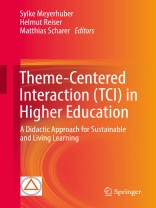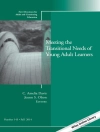This book presents thoughts on and experiences with the introduction of Theme-centered Interaction (TCI) into academia. TCI is a systematic didactic, ‘living learning’ approach originally developed by social psychologist and pedagogue Ruth C. Cohn. The book explains and introduces the method, attitude and theory of TCI to a broader, higher education audience and relates it to such questions as: How does a teacher in academia achieve a lively and engaging atmosphere in their seminars? How do young academics as leaders-to-be learn how to act socially sustainably in groups? Using practical examples, the book shows how TCI can work in higher education to achieve participation and integration, reflectivity and humane connectedness of academic teachers and students, and professional development of senior and junior academics.
Inhaltsverzeichnis
Preface.- Part I In-Depth Introductions to Theme-centered Interaction in Theory and Practice .- Theme-Centered Interaction for Educating Future Leaders. Applied Social Psychology for Teaching Academics to Act Socially Sustainably in Organisations; Sylke Meyerhuber.- Theme-Centered Interaction by Ruth C. Cohn: An Introduction: Matthias Scharer.- Concrete Methods and Case Experiences with Theme-Centered Interaction; Helmut Reiser with Hildtrud Loeken, Walter Lotz & Birgit Menzel, and Christoph Huber.- Part II Further Case Experiences in Different Fields of Study and Cultures.- On the Psychology of Civil Courage. A Theme-Centered Interactive Teaching Experiment – Reflections on the Process and Insights into the Subject; Friedemann Schulz von Thun and Roswitha Stratmann.- Big Themes for Little Kids? Living Learning in a Teacher-Training Course Dealing with Flight and Migration; Stefan Padberg.- First Steps with Theme-Centered Interaction in a Class for Clinical Psychology. How Students, Topics and Lecturer Gain from the Approach; Dora Pereira.- TCI Didactic in the Higher Education Context of Kerala / India – Experiences and Insights of Teaching English Language and Communication at the Tertiary Level; Joby Cyriac and C. A. Lal.- Part III Interdisciplinary Intersections .- Theme-Centered Interaction: Intersections with Reflective Practice in North American Religious Contexts; Mary E. Hess.- The Theme-Centered Interaction Approach in the Context of Intercultural Education and the Constructivist-Inspired Pedagogy: Potentialities and Perspectives; Svetlana Kurteš.- Part IV Reflections on the Future .- Theme-Centered Interaction In- and Outside of Academia –MOOCifying TCI; Annelies van der Horst.- Theme-Centered University Didactics – An Answer to Bologna. Summary of a Dissertation With the Same Title; Sandra Bischoff .- Theme-Centered Interaction in Personnel Development Schemes in Academia: Good Reasons and Practise Examples; Sylke Meyerhuber.- With insights from talks with Matthias Scharer (Austria), Gisela Liebens (Germany) and Matthias Kroeger (Germany), and appendix with reference list on TCI in higher education.- About Evidence. A Commentary on Theme-Centered Interaction Related Research from a Pedagogic Perspective; H. Reiser.- Glossary – Terminology of Theme-Centered Interaction and Humanistic Psychology; Sylke Meyerhuber.- The Contributors to ‘Theme-Centered Interaction in Higher Education.
Über den Autor
Sylke Meyerhuber, Dr. Phil. Psychology, systemic therapy and counselling training, holds a permanent position as a Senior Researcher at the University of Bremen (Germany), artec Research Centre for Sustainability Studies. As expert in applied Social Psychology and Organisational Psychology, she focuses her research on socially sustainably leadership in organizations and mindful change in times of permanent reorganization. Honoured by her university with the Berninghausen Prize for Outstanding Teaching in 2010, she lectures in German and English, based on TCI principles since 1996.
Helmut Reiser is Prof. Dr. Emeriti of Pedagogy for Behaviour Disorders from the University of Hannover (Germany). The renowned expert of didactics and pedagogy is a TCI-graduate & licensed TCI-lecturer. He held contact with Ruth C. Cohn since 1983. Additionally he partook in the innovation of the TCI-training first in WILL and later on in RCI. He is a supervisor DGf S, group-psychoanalytical supervisor, und organizational counselor, a teaching-supervisor, and additional he received training in systemic counselling. Beside his manifold other works, he wrote 40 TCI-articles und 2 books on TCI: Reiser & Lotz 1995, TZI als Pädagogik, Mainz; and Reiser 2006, Psychoanalytisch-systemische Pädagogik – Erziehung auf der Grundlage der Themenzentrierten Interaktion, Stuttgart.
Matthias Scharer, Prof. Dr. was a full professor at the Faculty of Theology/Practical Theology Department at the University of Innsbruck (Austria). He retired in 2014, yet continuously publishing and teaching. He is founder of the international research program “Communicative Theology” together with B. J. Hilerath (Tübingen, Germany) and B. Hinze (New York, USA). Since 2005, the program has focused on an interreligious education. Out of Europe he has conducted research in Latina America (Ecuador, Peru. Bolivia, Brazil), India, Africa and the US: Scharer is a certificated trainer at the Ruth Cohn Institute International for TCI and works mainly in cross-cultural and trans-religious contexts.












